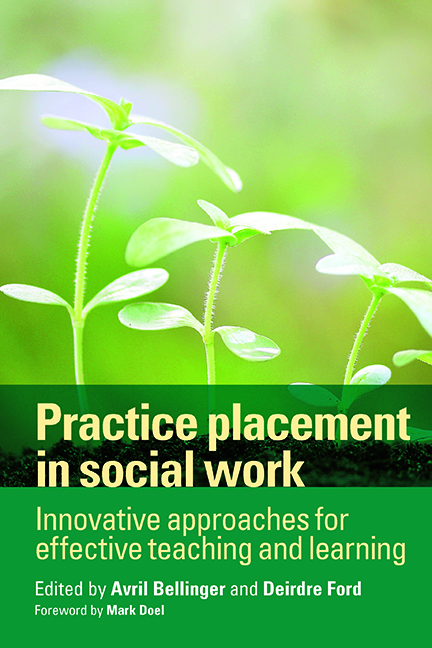Book contents
- Frontmatter
- Dedication
- Contents
- Foreword
- Notes on contributors
- Introduction
- One Student-led services
- Two International placements: learning from a distance
- Three The outside looking in – an independent social worker’s experience of practice educator work
- Four ‘Do you have to be white to pass this course?’ Developing support for black and minority ethnic students in a predominantly white area
- Five Men in social work education: building a gendered alliance
- Six Hidden in plain sight: use of an arts-based method for critical reflection
- Seven Getting our hands dirty: reconnecting social work education as if the earth matters
- Eight Social media for students in practice
- Nine Developing placement capacity in the third sector
- Ten Observations of student practice: what difference does observer qualification make?
- Eleven Filling the gap: constructive responses to the erosion of training standards for practice educators
- Twelve The concept of integrity in relation to failing and marginal students
- Thirteen Cultivating discretion: social work education in practice and the academy
- Index
Eleven - Filling the gap: constructive responses to the erosion of training standards for practice educators
Published online by Cambridge University Press: 01 September 2022
- Frontmatter
- Dedication
- Contents
- Foreword
- Notes on contributors
- Introduction
- One Student-led services
- Two International placements: learning from a distance
- Three The outside looking in – an independent social worker’s experience of practice educator work
- Four ‘Do you have to be white to pass this course?’ Developing support for black and minority ethnic students in a predominantly white area
- Five Men in social work education: building a gendered alliance
- Six Hidden in plain sight: use of an arts-based method for critical reflection
- Seven Getting our hands dirty: reconnecting social work education as if the earth matters
- Eight Social media for students in practice
- Nine Developing placement capacity in the third sector
- Ten Observations of student practice: what difference does observer qualification make?
- Eleven Filling the gap: constructive responses to the erosion of training standards for practice educators
- Twelve The concept of integrity in relation to failing and marginal students
- Thirteen Cultivating discretion: social work education in practice and the academy
- Index
Summary
Introduction
Learning in practice settings is a common component of all professional courses in health and social care in the UK, for example, nursing, social work, physiotherapy and speech and language therapy (Doel and Shardlow, 2009). It is seen as an essential feature in supporting the development of a competent practitioner and plays a central role in professional identity formation (Walker et al, 2008). For students on placement, there is the opportunity not only to ‘carry out’ practice, but critically to improve and extend their professional knowledge and process skills (Eraut, 1994). It must be recognised, however, that students experience varying degrees of quality in the practice learning experiences offered to them (Lefevre, 2005; Wilson et al, 2008). There is also a wide divergence of views on what constitutes ‘professional practice learning’. Some would see it as ‘practice experience’ – an opportunity to be in an agency and see others at work (Brennan and Little, 1996). Others see it as an apprenticeship (Field, 2004) or, developed further, as a reflective apprenticeship (Evans, 1999), while still others see it as an environment in which transformative learning can take place (Mezirow, 2003; Jones, 2009) through ‘disorientating’ dilemmas and creativity. These models of learning are not mutually exclusive.
Underpinning this chapter is the belief that transformative learning will afford students and those wishing to be engaged in their practice education the opportunity to develop their abilities as effective, self-aware and critical practitioners. It may even bring them to make a contribution to social transformation rather than maintaining and reproducing the existing social system (Jones, 2003). This chapter seeks to examine the gaps that have occurred in social work practice education, and to make the case for robust practice educator standards for practice outcomes.
Those who work with learners in practice have an array of titles depending on the profession, the country, the tasks undertaken and even, in some cases, the stage that the learner has reached, for example, field instructor, preceptor or mentor (nursing), practice teacher/assessor/educator (social work), practice educator (nursing), supervisor (physiotherapy, clinical psychology), and associate tutor (teaching). While a number of these terms are used by some interchangeably and as if they carry the same meaning, it is important to notice the differences in terminology, and the gaps and erosions in standards that they may be masking.
- Type
- Chapter
- Information
- Practice Placement in Social WorkInnovative Approaches for Effective Teaching and Learning, pp. 165 - 180Publisher: Bristol University PressPrint publication year: 2016



